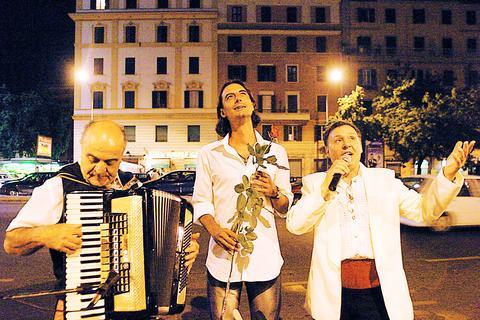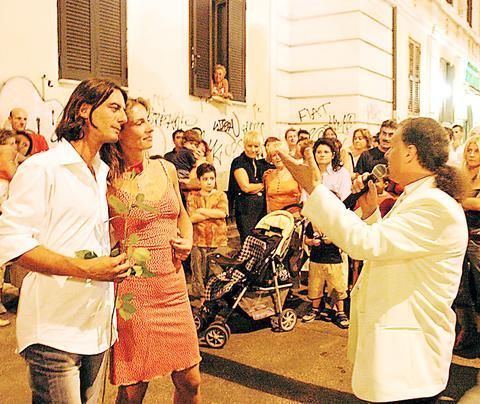The first notes of the serenade slipped through the window, the shutters flew open, and Francesca Bonanni glided out onto the balcony. Looking down at the busy street, she swooned upon seeing her tall, tan and handsome fiance.
The short, plump and somewhat gaudily dressed middle-aged fellow standing beside him seemed to attract less of her attention, even though he was the one singing his heart out.

PHOTO: NY TIMES
Since few men have the lungs to belt love songs properly over the city's noisy traffic and up to fourth-story windows, there is a small troupe of professional serenaders that Romans are increasingly hiring to do their courting for them.

PHOTO: NY TIMES
"If I could sing like him, then I'd be doing his job," explained Enrico Zaffari, the 36-year-old fiance.
He was referring to Ettore Spina, 56, who is a sort of matrimonial salesman traveling from balcony to balcony in a white suit jacket and red cummerbund to help vicariously woo the city's brides-to-be, at US$300 a night and up.
Sure, serenaders opt for tacky wedding singer apparel, use microphones to amplify their velvet voices and favor a sentimental repertory. But there is an overwhelming sweetness to their sappiness that strikes to the very core of the Roman heart.
"Romans are very warm-hearted, emotional people," said Zaffari, who was visibly moved by the roses Bonanni tossed him and the tunes Spina sang on the eve of his wedding day. "It's an important tradition, especially in the real Roman neighborhoods."
Rome's dozen or so serenaders tend to ply their trade in the less picturesque parts of town, where dewy-eyed romanticism is a key ingredient in the more authentic Roman flavor. Spina and his fellow serenaders are being called on so frequently to strum heartstrings here that they long ago gave up the day job.
"There has been a reawakening of sentiment," said Ezio Baiocco, 35, a well-known serenader who says he performs about 65 times a year. "The demand keeps growing."
In the last 10 years, Spina said, business has more than doubled in places like this graffiti-stained apartment building in Piazza Dell'Alberone, where the serenade took place on a recent balmy Friday evening.
It started at 10pm, and as a spotlight was fixed on that yonder window, Zaffari, Spina and his 70-year-old accordion player, Cosimo Villari, took their places on a sliver of cement between two busy streets.
No one seemed to mind the commotion or the fact that the men were flanked by a lingerie advertisement and a bus stop.
"It's going to be a beautiful night," said Spina, who stroked his graying ponytail and sucked in his stomach while an assistant struggled to get him into a tight cummerbund. "All these kids become like my godchildren, and I'm like their godfather."
As a crowd of invited friends, suspicious neighbors and curious onlookers gathered at the corner gelato shop, Spina explained that he had been performing ever since he was a kid accompanying his serenade-singing father.
"I remember the favors even married men would ask my father. `Please play her a song -- we got into a nasty fight,' and things like that."
He said that serenading went back many generations earlier, and that in the 1800s specific songs were written for every destination on the map of the Roman heart. There were songs for courting, songs for anniversaries, songs dedicated to fathers of the bride and songs to ask forgiveness.
"And there were songs to show your disrespect after you'd been dumped," Spina said.
Once the music had started and everyone's eyes turned up to see Bonanni emerging from her apartment with a surprised expression and a pink dress, Spina went into a rendition of Paradise Serenade, crooning, "Wake up, wake up, oh tenderness awake!"
As a large orange bus screeched to a halt behind him, he deftly stepped aside while picking up the slack in his microphone wire.
The accordion player, Villari, remembered a time when such amplification wasn't necessary.
"Now they want all the power and spectacle," he said, admitting, however, that the buzzing scooters and bleating horns present a challenge even when they perform in quieter courtyards.
While many cars rushed by without a pause, a young couple on a scooter stopped to listen, caressing each other under the streetlight. A pedestrian put his cellphone up to the speakers, and neighboring shutters opened to reveal old women with cotton-ball hair looking dreamily down at the young lover and his surrogate singer.
But not everyone was so enamored.
"The music could be more modern," said Laura Gentili, a 29-year-old secretary licking a gelato cone and watching the serenade from the corner. "I mean, traditional love songs are not exactly the top."
"I wouldn't want one," she said. "I mean the days of Romeo and Juliet are over. And what if you walk out there and you're wearing curlers? It would be a tragedy."
But Spina warned against declining a serenade, recalling the "only time in history" when a woman absolutely refused.
"It was the eve of their wedding," he said. "The next day in church, he was the no-show," Spina said, adding that the serenade and subsequent wedding went ahead a week later. "This is a gift that a man makes to a woman. You don't refuse it. You accept, and that's that."

On April 26, The Lancet published a letter from two doctors at Taichung-based China Medical University Hospital (CMUH) warning that “Taiwan’s Health Care System is on the Brink of Collapse.” The authors said that “Years of policy inaction and mismanagement of resources have led to the National Health Insurance system operating under unsustainable conditions.” The pushback was immediate. Errors in the paper were quickly identified and publicized, to discredit the authors (the hospital apologized). CNA reported that CMUH said the letter described Taiwan in 2021 as having 62 nurses per 10,000 people, when the correct number was 78 nurses per 10,000

As we live longer, our risk of cognitive impairment is increasing. How can we delay the onset of symptoms? Do we have to give up every indulgence or can small changes make a difference? We asked neurologists for tips on how to keep our brains healthy for life. TAKE CARE OF YOUR HEALTH “All of the sensible things that apply to bodily health apply to brain health,” says Suzanne O’Sullivan, a consultant in neurology at the National Hospital for Neurology and Neurosurgery in London, and the author of The Age of Diagnosis. “When you’re 20, you can get away with absolute

May 5 to May 11 What started out as friction between Taiwanese students at Taichung First High School and a Japanese head cook escalated dramatically over the first two weeks of May 1927. It began on April 30 when the cook’s wife knew that lotus starch used in that night’s dinner had rat feces in it, but failed to inform staff until the meal was already prepared. The students believed that her silence was intentional, and filed a complaint. The school’s Japanese administrators sided with the cook’s family, dismissing the students as troublemakers and clamping down on their freedoms — with

As Donald Trump’s executive order in March led to the shuttering of Voice of America (VOA) — the global broadcaster whose roots date back to the fight against Nazi propaganda — he quickly attracted support from figures not used to aligning themselves with any US administration. Trump had ordered the US Agency for Global Media, the federal agency that funds VOA and other groups promoting independent journalism overseas, to be “eliminated to the maximum extent consistent with applicable law.” The decision suddenly halted programming in 49 languages to more than 425 million people. In Moscow, Margarita Simonyan, the hardline editor-in-chief of the